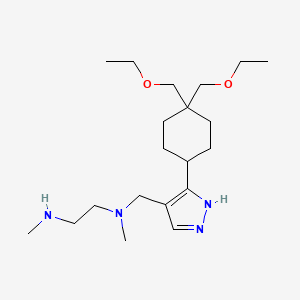Ferroptosis-centered Drug Response Information
General Information of the Drug (ID: ferrodrug0328)
| Name |
GSK3368715
|
||||
|---|---|---|---|---|---|
| Synonyms |
1629013-22-4; GSK3368715; EPZ019997; N~1~-({5-[4,4-bis(ethoxymethyl)cyclohexyl]-1H-pyrazol-4-yl}methyl)-N~1~,N~2~-dimethylethane-1,2-diamine; N'-[[5-[4,4-bis(ethoxymethyl)cyclohexyl]-1H-pyrazol-4-yl]methyl]-N,N'-dimethylethane-1,2-diamine; N1-((3-(4,4-Bis(ethoxymethyl)cyclohexyl)-1H-pyrazol-4-yl)methyl)-N1,N2-dimethylethane-1,2-diamine; SCHEMBL16121956; EX-A4367; MFCD32174310; NSC823806; AKOS040733328; EPZ-019997; NSC-823806; GSK-3368715; N'-[[3-[4,4-bis(ethoxymethyl)cyclohexyl]-1H-pyrazol-4-yl]methyl]-N,N'-dimethyl-ethane-1,2-diamine; PS-18471; SY311406; HY-128717; CS-0099584; F88777; EN300-7443094; {2-[({3-[4,4-bis(ethoxymethyl)cyclohexyl]-1H-pyrazol-4-yl}methyl)(methyl)amino]ethyl}(methyl)amine; KZS; N1-[[3-[4,4-Bis(ethoxymethyl)cyclohexyl]-4-pyrazolyl]methyl]-N1,N2-dimethylethane-1,2-diamine
Click to Show/Hide
|
||||
| Status |
Phase 1
|
||||
| Drug Type |
Small molecular drug
|
||||
| Structure |
 |
||||
| Formula |
C20H38N4O2
|
||||
| IUPAC Name |
N'-[[5-[4,4-bis(ethoxymethyl)cyclohexyl]-1H-pyrazol-4-yl]methyl]-N,N'-dimethylethane-1,2-diamine
|
||||
| Canonical SMILES |
CCOCC1(CCC(CC1)C2=C(C=NN2)CN(C)CCNC)COCC
|
||||
| InChI |
InChI=1S/C20H38N4O2/c1-5-25-15-20(16-26-6-2)9-7-17(8-10-20)19-18(13-22-23-19)14-24(4)12-11-21-3/h13,17,21H,5-12,14-16H2,1-4H3,(H,22,23)
|
||||
| InChIKey |
SPEGERVLTUWZPA-UHFFFAOYSA-N
|
||||
| PubChem CID | |||||
| TTD Drug ID | |||||
Full List of Ferroptosis Target Related to This Drug
Long-chain-fatty-acid--CoA ligase 1 (ACSL1)
| In total 1 item(s) under this Target | |||||
| Experiment 1 Reporting the Ferroptosis-centered Drug Act on This Target | [1] | ||||
| Target for Ferroptosis | Driver | ||||
| Responsed Disease | Acute myeloid leukaemia | ICD-11: 2A60 | |||
| Responsed Regulator | Protein arginine N-methyltransferase 1 (PRMT1) | Suppressor | |||
| Pathway Response | Fatty acid metabolism | hsa01212 | |||
| Cell Process | Cell ferroptosis | ||||
| In Vitro Model | NB4 cells | Acute promyelocytic leukemia | Homo sapiens | CVCL_0005 | |
| HEL cells | Erythroleukemia | Homo sapiens | CVCL_0001 | ||
| MOLM-13 cells | Adult acute myeloid leukemia | Homo sapiens | CVCL_2119 | ||
| HEK-293T cells | Normal | Homo sapiens | CVCL_0063 | ||
| In Vivo Model |
5 x 106 NB4 cells were subcutaneously injected into the flank of 6-7-week-old female nude mice. The tumor number, body weight, and tumor volume were measured every other day. Tumor volumes were estimated using the following formula: tumor volume = (length x width2)/2. When tumor volumes reached 100-200 mm3, the mice were randomly divided into solvent control, RSL3, GSK3368715, or RSL3 + GSK3368715 combination groups (six mice per group). Specifically, for the RSL3 group, mice received intraperitoneal injections of RSL3 at 50 mg/kg 2 days apart. In the GSK3368715 group, GSK3368715 was intraperitoneally injected into mice at a dose of 75 mg/kg for 2 consecutive days per week. For the group that received RSL3 + GSK3368715 combination treatment, GSK3368715 (75 mg/kg) was administered by intraperitoneal injection for the first 2 days. Immediately thereafter, the mice received an intraperitoneal injection of RSL3 (50 mg/kg) 2 days apart. After 1 day of rest, the cycle was repeated until the end of the study on Day 21. Tumor volumes and body weights of the mice were measured and recorded every other day.
Click to Show/Hide
|
||||
| Response regulation | Both GSK3368715 and PRMT1 knockout upregulated acyl-CoA synthetase long-chain family member 1 (ACSL1), which acts as a ferroptosis promoter by increasing lipid peroxidation. Knockout ACSL1 reduced the ferroptosis sensitivity of Acute myeloid leukemia (AML) cells following GSK3368715 treatment. Overall, PRMT1 inhibition promotes ferroptosis sensitivity via ACSL1 upregulation in acute myeloid leukemia. | ||||
